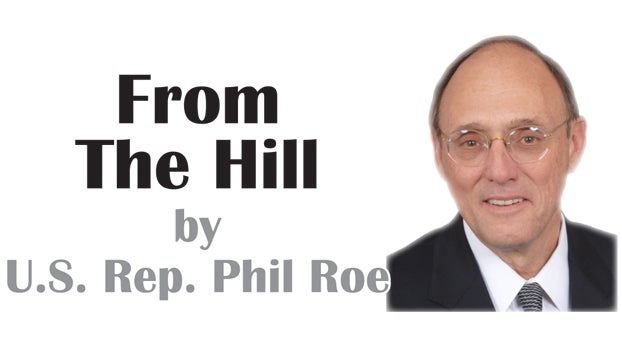Doubling down on skyrocketing costs of college education
Published 8:27 am Monday, November 4, 2019
BY REP. PHIL ROE
Growing up, my father worked in a factory and my mother worked as a bank teller. I lived at home while attending Austin Peay State University before enrolling in medical school at the University of Tennessee. After graduating — and serving our country in the U.S. Army — I was able to use my G.I. Bill benefits to pay for a portion of my medical school education. Because of this benefit, I never had to take out student loans, giving me the ability to graduate college without debt. As I reflect back, I think what a tremendous advantage it was to start out without a crippling debt burden.
Unfortunately, this is increasingly uncommon among students who pursue higher education. The cost of college is increasing at an unsustainable rate. Over 40 million Americans have accumulated over $1.5 trillion in student loan debt. The average tuition at public four-year institutions has risen from $3,190 in 1988 to $9,970 in 2018, while the average tuition at private four-year non-profits has risen from $15,160 in 1988 to $34,740 in 2018.
We all agree student loan debt and the cost of education are out of control and must be addressed. This week, rather than putting forward reforms that address the skyrocketing cost of education, House Education and Labor Committee Democrats put forth the College Affordability Act (CAA) which will likely further increase the cost of higher education. Seventy percent of taxpayers have no postsecondary degree and won’t benefit from this legislation, but they will foot a portion of this bill’s $400 billion cost.
At a time when America is facing a labor shortage of around 7.6 million workers, the CAA fails to address the skills gap and connect our education system with the needs of employers. Nationally, as many as 35 percent of small businesses are unable to find qualified applicants for open positions, and East Tennessee is no different. There are good-paying jobs in areas that do not require a bachelor’s degree, and Congress should be encouraging states to innovate with their higher education funding. Tennessee is a leader in this area through the Tennessee Promise and Tennessee Reconnect. Tennessee Promise gives high school graduates two years of tuition-free community or technical college and Tennessee Reconnect provides free education for adults looking to be retrained and receive an associate degree or a degree from a technical college. These programs work for Tennessee, and encouraging state flexibility will allow other states to find models that work for students in their states.
One of the most significant drawbacks of the CAA is that it will do nothing to address the regulatory burdens colleges face, which studies show is a significant driver of college cost increases. According to a 2015 Vanderbilt University study, schools already spend about 11 percent of their budget, and 15 percent of faculty time, on federal regulation compliance. This same study estimated the U.S. higher education system spends $27 billion annually to comply with these regulations. Every dollar spent on compliance is one added to tuition, not spent on students. That’s why I introduced an amendment to prohibit this bill from going into effect unless studies show it will not increase the cost of attendance for students. The fact that committee Democrats unanimously voted my amendment down shows their lack of confidence this bill will lower costs.
Another significant issue on college campuses these days is the battle over free speech on college campuses. Colleges were once hotbeds of free speech and debate, and this right is guaranteed by the First Amendment. Disturbingly, around 10 percent of American colleges now restrict constitutionally-protected free speech to a particular corner of campus, and about 30 percent of colleges have restrictive speech codes. I believe colleges and universities should be places that foster free and open exchange of ideas. To encourage this, I introduced an amendment that simply requires schools to be transparent about any speech codes or policies they have in place that restricts this fundamental American right — nothing more. Even something this non-controversial was defeated by the majority.
We need a 21st Century education system that helps students succeed in the global economy and puts hardworking Americans on the path to success. We need to reduce the cost of college and better align education with the needs of employers, so the CAA was a missed opportunity. I’m committed to continuing to find solutions because it’s too important to our future success as a country.




